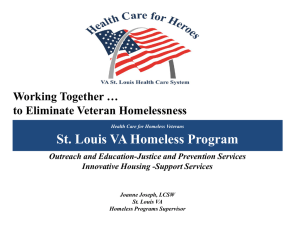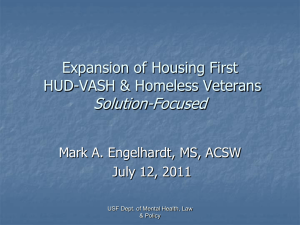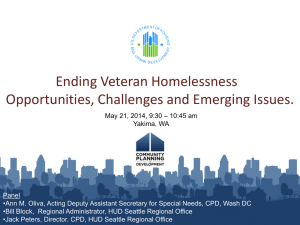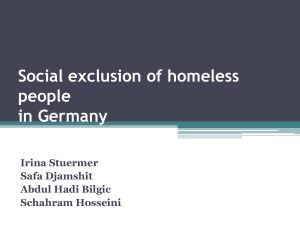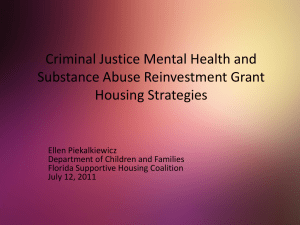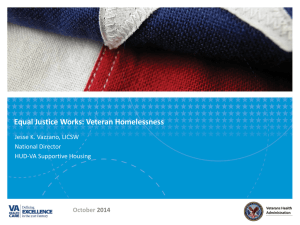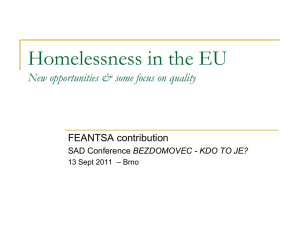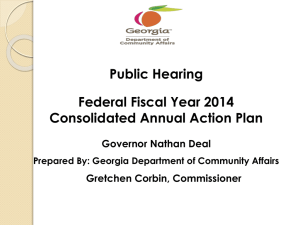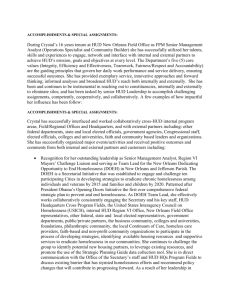Federal Budget and Appropriations Process
advertisement
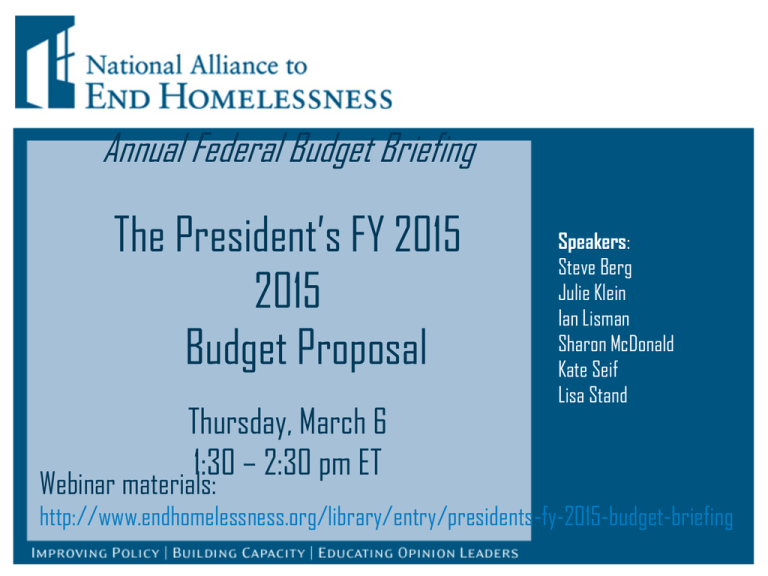
Annual Federal Budget Briefing The President’s FY 2015 2015 Budget Proposal Thursday, March 6 1:30 – 2:30 pm ET Speakers: Steve Berg Julie Klein Ian Lisman Sharon McDonald Kate Seif Lisa Stand Webinar materials: http://www.endhomelessness.org/library/entry/presidents-fy-2015-budget-briefing Introductory Logistics Submit Questions! Lines are muted to facilitate this call. A recording of this webinar will be posted online / emailed in the next few days If you have questions during the webinar, submit them in the question box on your control panel. We will answer as many questions as possible at the end of the webinar. Today’s Agenda • Introduction • Overview: Federal Budget and Appropriations Process • Rundown of President’s FY 2015 Budget – HUD, VA, HHS • 2014 Budget and Policy Outlook • Getting Involved in 2014 to Prevent and End Homelessness – Alliance Advocacy Initiatives • Q&A Federal Budget and Appropriations Process • Back to regular order? – President’s Budget a few weeks late, but still more or less the beginning of the process • President’s Budget serves as “benchmark” for congressional Democrats, particularly around the election. – More of an “ideal situation” Proposal Federal Budget and Appropriations Process • Topline spending level for federal budget already decided in December (Bipartisan Budget Act) – Provides only $2 billion in additional funding (over FY 2014) for non-defense discretionary programs – Appropriations Committees will still decide topline number for each Subcommittee • How much each Subcommittee will have to Federal Budget and Appropriations Process • Subcommittees fund programs at specific levels by drafting and passing bills • Final bills must be approved by Congress and the President • This process expected to proceed normally this year! – Though elections could hinder progress – Will depend a lot on House Leadership Federal Budget and Appropriations Process • President’s Budget is NOT law • Congress ultimately decides funding levels • Congress relies on YOU to make good decisions • Need to understand impact of funding on programs and people President’s Budget Overview • HUD budget includes $1.25 billion increase over FY 2014 – Focused on keeping people in housing – big vote of confidence for HUD • VA continues commitment to ending veteran homelessness – Significant resources proposed for homeless veteran programs • HHS budget focuses on most vulnerable people – Including mental health services, Medicaid HUD McKinney-Vento Homeless Assistance Grants – At least $215 million for ESG • Slightly less than FY 2014 level of $250 million, but HUD could choose to allocate more, depending on recaptures, etc. – Funds all renewals from FY 2014 – Additional funds focused on PSH to meet goal of ending chronic homelessness by 2016 $2.405 Billion HUD Tenant-Based Rental Assistance - $20 billion – $75 million for appx 10K new VASH – $108 million to renew mainstream vouchers through Section 811 – $1.705 billion for administrative fees ($200 million increase over HUD Other programs • Public Housing – Capital Fund (very slight increase) – Operating Fund ($200 million increase) • Choice Neighborhoods ($30 million increase) • CDBG ($2.856 billion – slight decrease) • HOME ($950 million – slight decrease) • Elderly Housing (Section 202) ($438 million – $54 million increase) Veterans Affairs Veterans Homeless Programs: Proposed FY 2015 Budget: $1.6 Billion 12.5% increase ($200 Million) Veterans Affairs The budget continues to support the goal of ending homelessness among veterans by the end of 2015. * Projected outcomes based on VA plan. Veterans Affairs Supportive Services for Veteran Families (SSVF) ~ Proposed $500 million – a 67% increase over FY 2014 level of $300 million. SSVF “Surge” Funding • $300 million to 76 communities that have the highest need. • NOFA Closes March 14 at 4pm ET • Must be endorsed by CoC • Go to the Alliance website for more information. • This is one time funding spread over three years from –FY 2014 Veterans Affairs & HUD HUD-VASH Housing Vouchers • 10,000 additional HUD-VASH vouchers proposed. • VA budget: case management $321 million • HUD budget: additional $75 million for housing choice Veterans Affairs Grant and Per Diem (GPD) • Slight increase to $252 million • Continues to support transition in place. Veterans Administration Advance appropriations for FY 2016 • Commitment to the goal of ending veteran homelessness • Funds Rapid Re-housing and prevention (SSVF) at a scale necessary to end veteran homelessness. Department of Labor VETS Homeless Veterans Reintegration Program (HVRP) • Proposed $38 million (no increase) • HVRP funding was increased in Homeless Children & Youth • Level-funding for the Runaway and Homeless Youth Programs – $53 million for Basic Center – $44 million for Transitional Living – $17 million for Street Outreach • $2 million request for incidence and prevalence study of homelessness among unaccompanied youth. • $65 million for Education of Homeless Children and Youth (level funding). Programs Serving Families and Children • Increase for Child Care and Early Education – Child Care Development Block Grant (2% increase) and Head Start (3% increase) • Domestic Violence Programs – $135 million for Family Violence Prevention and Services ($1 million increase). Programs Serving Vulnerable Families • LIHEAP – budget proposes funding at $2.8 billion (18% less than FY 2014) • Community Services Block Grant budget proposes $350 million for FY 2015 (48% less than FY 2014). • Promoting Safe and Stable Families – level funded at $60 million in discretionary funding. HHS Health Care – Key Discretionary Programs Key discretionary health care programs increased • Community Health Centers - $4.6 billion (discretionary and mandatory ACA) – Means $400 million for HCH projects • Ryan White HIV/AIDS Program -$2.323 billion (slightly more than $2.319 billion this year) HHS Health Care – Key Discretionary Programs Key SAMHSA programs level funded • PATH – $65 million • Other services for homeless – $74 million • Block Grants – Mental Health – $484 million – Substance Abuse – $1.820 billion HHS Health Care – Medicaid and ACA Gaps Medicaid expansion took effect January 1, 2014 • 25 states and District of Columbia opted in • 4+ million vulnerable people left uninsured in remaining states ACA mandatory CHC funding expires after FY15 Federal Budget and Policy Outlook • Budget Proposal reflects the value placed on homeless assistance • Sequestration impacts still lingering • Take advantage of “normal” process • Working to secure increased Getting Involved in 2014 • Advocacy Toolkit • Join an email list: – Advocacy Update – Issue-Specific Working Groups •McKinney and Veterans http://www.endhomelessness.org/pages /advocacy Getting Involved in 2014 • Top priorities: – Provide $2.405 billion for HUD’s McKinney-Vento programs – Provide $1.6 billion for VA’s Zero Homelessness Initiative – Expand HUD funding Full List available at: http://www.endhomelessness.org/pages/p olicy_priorities Getting Involved in 2014 High-Priority FY 2015 Advocacy Initiatives 1. McKinney-Vento Appropriations Campaign – Meetings, site visits, calls, letters, and media efforts – Campaign website: http://www.endhomelessness.org/pa ges/fy-2015-mckinney-campaign • Launching Letter Writing Campaign! – Send 500 letters urging Members to submit Programmatic Requests by Getting Involved in 2014 2. VA’s Zero Homelessness Initiative – VA’s Goal: End Veteran Homelessness by the end of 2015 – Educate Congress on the importance and achievability of this goal – Campaign website: http://www.endhomelessness.org/pages/fy2015-veterans-campaign • Join the Never Another Homeless Veteran Campaign! www.neveranotherhomelessveteran.org Question and Answers Please ask your questions now! Have more questions? Want to get involved? Please email: Kate Seif cseif@naeh.org / 202-942-8256 HUD Funding Letter • Get your organization to sign on in support of additional HUD funding! • Sign the “302(b) letter” TODAY! https://nlihc.wufoo.com/forms/th ud-302b-signon-letter/
